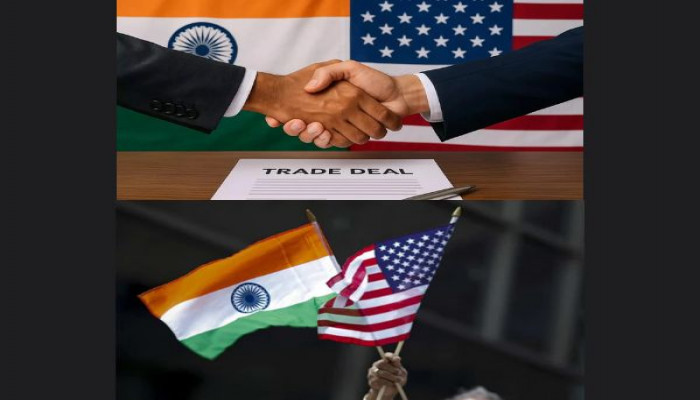India Stands Firm Against US Pressure in Trade Talks to Protect Farmers, Data, and Healthcare
- In Reports
- 05:57 PM, Jun 11, 2025
- Myind Staff
India spurned what it termed "take it or leave it" demands from the United States during the current trade negotiations. It refused to open up highly sensitive areas such as dairy, agriculture, and digital services without securing reciprocal access. Negotiations held in New Delhi from June 4 to 10 stalled when Washington demanded market access without easing its own barriers. With US tariffs looming by July 8, India stood up for its domestic interests. It signalled that it would not compromise its economic sovereignty for a one-sided deal.
The world observed as two major economies tried to negotiate a critical trade pact. India drew a hard line and did so with reason. In recent high level talks, India accused the United States of using "take it or leave it" tactics to push through a deal that served mostly US interests. But India held firm.
According to reports by Mint, the negotiations in New Delhi, led by US Trade Representative Brendan Lynch, were frazzled. Washington pressured India to open its most sensitive sectors, including dairy, agriculture, digital trade, and pharmaceuticals. India resisted and demanded fairness, respect, and reciprocity.
Almost 60 per cent of India’s population depended directly or indirectly on agriculture for their livelihood. The sector contributed about 18 per cent to India's GDP. More importantly, it helped maintain rural stability and food security. The United States pushed for steep tariff cuts on products like shrimp, dairy, almonds, and apples, goods that were heavily subsidised and mass-produced in the West. India warned that such access would harm domestic farmers, many of whom operated on tight margins and relied on state protection. India made its position clear; it could not accept a deal that left Indian farmers to bear the cost.
India produced and consumed more dairy than any other country. The sector remained highly decentralised, driven by small-scale farmers and cooperatives such as Amul. It also held cultural significance; the majority of Indians followed vegetarian dietary norms, and cows were considered sacred. The US dairy industry used non-vegetarian animal feed, a practice that India did not allow for imports. Indian negotiators stated clearly that unless the US adapted to India’s vegetarian certification norms, dairy products like cheese and butter would not be permitted. This issue was not only about trade, but it involved cultural values and rural livelihoods.
India built one of the world’s fastest-growing digital economies, attracting major US tech and data firms. The US wanted India to ease restrictions on data localisation, digital taxation and the cross-border flow of sensitive medical and consumer data. India saw this as a threat to data sovereignty and cybersecurity. It warned that if Indians’ sensitive data were stored or processed outside the country, it could lead to regulatory evasion, privacy violations, and foreign surveillance. India stood firm; its digital economy was not up for negotiation without safeguards.
India became known as the "pharmacy of the world", producing low-cost medicines and vaccines for many developing countries. The US asked India to relax price controls on essential medical devices and pharmaceutical products. India warned that doing so could reduce healthcare access for millions. India also raised concerns about the US’s strict drug import rules, where entire consignments could be destroyed if a small sample failed quality checks, a practice India called economically harmful and unfair. India maintained that health was not a commodity and it would not let profit come before public access.
India expressed frustration that while the US sought greater access to Indian markets, it offered little in return. There was no serious discussion about opening US markets to Indian exports like textiles, generic drugs, or IT services. This lack of balance violated the February 13 joint statement, which promised a "mutually beneficial" trade deal. Indian officials said the talks became increasingly one sided, with Washington pushing take it or leave it terms on critical sectors.
If the two countries failed to reach a deal by July 8, Indian goods would face a universal 10 percent US tariff and an additional 16 percent country specific duty. The US considered this leverage, but India treated it as a test of sovereignty. Rather than yield to pressure, India signalled that it would absorb short term losses to protect long term national interests. India believed a trade deal should benefit people, not punish those unwilling to accept unequal terms.
India was not opposed to trade. It made it clear that economic cooperation must respect national dignity. Refusing a "take it or leave it" offer was not an act of defiance; it was a show of maturity. India asked for equal footing in a global partnership.
Jeff M Smith of the Heritage Foundation warned at the USISPF summit, "If we want India to be a partner on US core interests, we must be a partner to India on its core interests… or we will be disappointed. Deservedly so!"







Comments